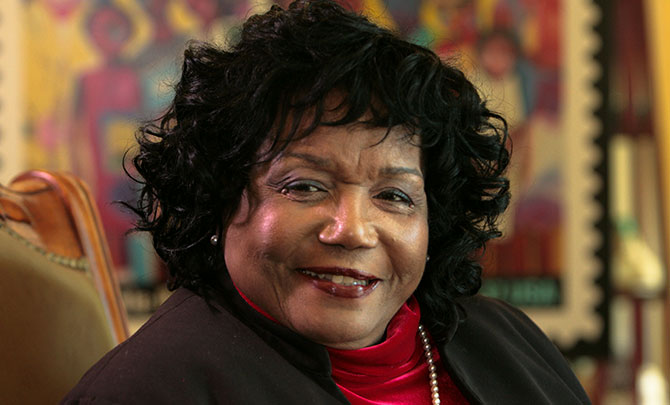Interview: Fear no evil - Reform Magazine
Civil rights hero Melba Pattillo Beals talks to Stephen Tomkins
Melba Pattillo Beals was one of the Little Rock Nine, a group of African American children who joined the previously all-white Central High School in Little Rock, Arkansas, in 1957, after the US Supreme Court ruled segregation unconstitutional. The 15 year olds faced such mob violence that eventually they were escorted into the school daily by paratroopers. Even then, their lives were in such danger that they had to be sent out of Little Rock to foster families, Melba’s in California, to complete their schooling.
Professor Pattillo Beals – despite continued obstacles she eventually gained a doctorate in education and a chair at Dominican University of California – has a story of extraordinary courage and resilience, and of a compelling faith in God that has brought her through hard times and deathly valleys. More of her story than we could cover in this interview is told in her latest memoir, I Will Not Fear: My story of a lifetime of building faith under fire (Revell, 2018).
I Will Not Fear pays tribute to your wonderful grandmother, India Annette Peyton. Can you tell me about her attitude to life?
India Annette Peyton was a maid in white ladies’ kitchens – a dollar a day she earned and was treated terribly. That movie The Help was a very lightweight version of some of the awful things that happened to her. Yet she always maintained the attitude that God was with her, that God valued her and that her worth was undeniable. She taught me that whatever happens will always have positive results, and that you will get to see them – not now perhaps, but it will happen.
That attitude is what kept me alive. I was a very strange child, because at a very young age I perceived my position in society. Most children think everything is OK, but I thought: Why can’t I drink at the water fountain? What do you mean I can’t sit in that seat on the bus?! I was very inquisitive and very annoyed. From the beginning, Grandma had to console me along. That’s when she told me the Lord Jesus loved me and had my picture on his refrigerator, and she made me feel equal.
What was it like growing up as an African American girl in Little Rock?
No one bends over your crib and says: ‘Look, Melba, it’s not going to go very well for you. You’re a second-class citizen. You don’t get your share of the goodies.’ You discover day by day, moment by moment, teaspoon by teaspoon; your self esteem is usurped by it. I remember going to the store with my parents when I was three, and I noticed that these strong, straight-shouldered people who told me about how to be proud of myself suddenly became cissies – bowing, speaking in a different rhythm: ‘Yassuh’, ‘Nossuh.’ All those horrifying answers they had to give white people in order to live. I couldn’t understand, if they wanted me to behave with pride, why they behaved like this. And my Grandma had lectured me about sharing: ‘It’s your brother’s turn, don’t step in front of him.’ So why were white folks stepping in front of us? I just really, really, really resented that kind of behaviour.
I told them early: ‘I want outta here!’ When I was four, my grandmother caught me sitting in front of the house in my red wagon. ‘Why,’ she said, ‘are you sitting in the sun? You’re going to get ill.’ ‘Because you said the stork delivered me, so when he comes to deliver others, I’m going to hitch a ride out of Little Rock.’
As a black kid, everywhere you go – ‘You’re going to a separate school,’ ‘Sit in the back of that bus,’ ‘You can’t sit at that swimming pool.’ When I was very young, I got picked up by members of the Klan and almost raped. So I was really, really angry about where I was, and it took a lot of work on my grandmother’s part to make me understand: ‘Although things aren’t going as you perceive they should be, you are still being loved by the Lord Jesus. And you will learn later how this all comes together.’ She was correct…
___
This is an extract from an article that was published in the December 2018 / January 2019 edition of Reform















Submit a Comment